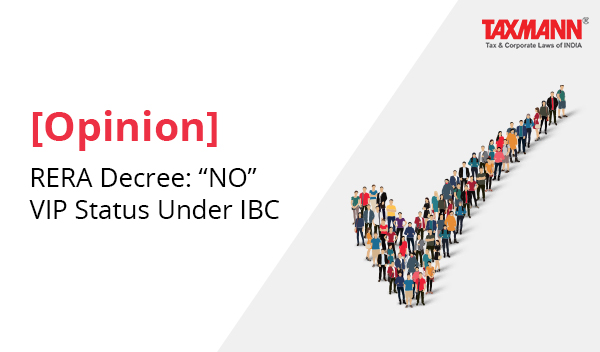[Opinion] RERA Decree: “NO” VIP Status Under IBC
- Blog|News|Insolvency and Bankruptcy Code|
- 3 Min Read
- By Taxmann
- |
- Last Updated on 10 January, 2024

Nipun Singhvi, Pranjul Chopra & Ankur Jain – [2024] 158 taxmann.com 205 (Article)
Introduction
In a landmark judgment, the Supreme Court of India has recently brought clarity to a longstanding debate concerning the position of home buyers in real estate projects within the ambit of the Insolvency and Bankruptcy Code, 2016 (hereinafter ‘Code, 2016’). The case of Vishal Chelani v. Debashis Nanda addresses a crucial legal question, whether home buyers who secure a decree of refund under the Real Estate (Regulation and Development) Act, 2016 (hereinafter ‘Act, 2016’) can be classified as ‘allottee’ and be treated as financial creditors as per Section 5(8)(f) of the said Code, 2016. This analysis seeks to offer a concise overview of the legal landscape preceding the recent Supreme Court judgment, followed by facts of the case, issues involved, the central question of law, and the court’s finding, and finally, it concludes with a comprehensive analysis on the implications of this landmark judgment.
Developments Under IBC vis-à-vis Home Buyers Rights
Prior to the Insolvency and Bankruptcy Code (Second Amendment) Act, 2018, homebuyers were not considered to be financial creditors under the said Code, 2016. The impetus for amending the definition of ‘Financial Creditor’ under Section 5(8)(f) of the said Code, 2016 and to include homebuyers as financial creditors arose from the plight of countless homebuyers across the nation, who faced uncertainties regarding the possession of their flats and apartments. In response to this pressing issue, Section 5(8)(f) of the said Code, 2016 was amended by inserting the Explanation, whereby it was inserted that any amount raised from an allottee under a real estate project shall be deemed to be an amount having the commercial effect of a borrowing. This statutory recognition of the outstanding debt owed to allottees in real estate projects as ‘Financial Debt’ resulted in home buyers being expressly acknowledged as ‘Financial Creditors’ under the said Code, 2016.
Facts of the Case
The factual matrix of the present case involves a group of homebuyers who, in the period of 2011-2012, booked flats in a project named ‘Bulland Elevates’ developed by Bulland Buildtech Pvt. Ltd. There was a delay in the completion of the project and hence they filed a complaint before the Uttar Pradesh Real Estate Regulatory Authority (‘UPRERA’). Their complaint was admitted, and the recovery certificate was issued for refund of the amount to the homebuyers. Subsequently, proceedings under the Insolvency and Bankruptcy Code (IBC) were initiated and as per the resolution plan presented before the Adjudicating Authority (National Company Law Tribunal, New Delhi Bench – II), a distinction was made between home buyers, who had opted for remedy before the UPRERA and secured orders in their favour, and those who did not. Homebuyers who did not approach authorities under RERA were given the benefit of 50% better terms than that given to those who approached RERA or who were decree holders. Interlocutory Application filed by homebuyers wherein they prayed to admit their claim under Form CA and be treated as ‘allottees’ under class of creditor was rejected by the Adjudicating Authority. Subsequently, an appeal was filed by homebuyers before the Hon’ble National Company Law Appellate Tribunal, which was also rejected. Consequently, the homebuyers approached the Hon’ble Supreme Court to address and settle the disputed legal questions arising from these circumstances.
Click Here To Read The Full Article
Disclaimer: The content/information published on the website is only for general information of the user and shall not be construed as legal advice. While the Taxmann has exercised reasonable efforts to ensure the veracity of information/content published, Taxmann shall be under no liability in any manner whatsoever for incorrect information, if any.

Taxmann Publications has a dedicated in-house Research & Editorial Team. This team consists of a team of Chartered Accountants, Company Secretaries, and Lawyers. This team works under the guidance and supervision of editor-in-chief Mr Rakesh Bhargava.
The Research and Editorial Team is responsible for developing reliable and accurate content for the readers. The team follows the six-sigma approach to achieve the benchmark of zero error in its publications and research platforms. The team ensures that the following publication guidelines are thoroughly followed while developing the content:
- The statutory material is obtained only from the authorized and reliable sources
- All the latest developments in the judicial and legislative fields are covered
- Prepare the analytical write-ups on current, controversial, and important issues to help the readers to understand the concept and its implications
- Every content published by Taxmann is complete, accurate and lucid
- All evidence-based statements are supported with proper reference to Section, Circular No., Notification No. or citations
- The golden rules of grammar, style and consistency are thoroughly followed
- Font and size that’s easy to read and remain consistent across all imprint and digital publications are applied



 CA | CS | CMA
CA | CS | CMA
